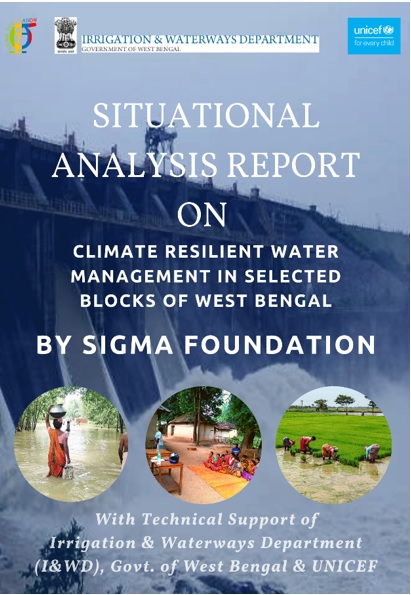SITUATIONAL ANALYSIS Report on Climate Resilient on Climate Resilient Water Management in Selected Blocks of West Bengal
Contributed By: Dr. M.N.Roy, Dr. Debasri Mukherjee, Dr. Tanushree Dutta, Mr. Ritaban Mitra, Mr. Saptadip Chakravorty, Mrs. Riyanka Ghosh, Mr. Debojyoti MjaumdarField Officers: Mr. Aslam Ali, Mr. Rupam Mondol, Mr. Kabirul Islam
The effects of climate change are now becoming a serious concern for the global communities, especially in developing countries where exposure to risk is greater but resilience is low. Development of climate resilient infrastructures related to drinking water supply and irrigation management are gaining importance in this background. Further, Irrigation & Waterways Department of the state government with support of the Asian Infrastructure Development Bank AIIB) and the World Bank to have renovation of the DVC (Damodar Valley Corporation) irrigation infrastructure. However, the interventions are in the supply side and there is also need for community level interventions. UNICEF with support from AIIB took up a study to assess the status of knowledge, attitude and practice related to Climate Resilient Water Management (CRWM) and they partnered with SIGMA Foundation to take up the study in the selected blocks of West Bengal, namely, Barjora in Bankura district and Chanditala I and Jangipara in Hooghly district which are under the command area of the DVC.
The study adopted a mixed methods research design. The quantitative and qualitative data collected from the three selected blocks mainly to look at the issues of water availability, agricultural & irrigation practices, knowledge and awareness about climate change, perceptions about climate change and the associated practices regarding water use and management. Qualitative interviews were also conducted with various stakeholders such as GP Pradhan/Officials, water sellers, farmers and SHG members (women or domestic water managers) to gain key insights on the above issues.
It was found that awareness among the community members regarding climate change and its associated impacts on their life and livelihood was generally poor. The accessibility to safe and adequate water varied by social identity. Water is gradually becoming a scarce resource and is leading to intensified deprivation among rural communities along with rise in social conflicts. Sustainable Development Goal 6 states the importance of clean and safe water availability for all. The study highlights that incidence of water poverty is quite high among the rural households, especially among lower caste groups, where accessibility, affordability and quality of water all are key issues. The heavy rate of abstraction of groundwater is leading to drying up of surface water bodies as well as primary water sources in the villages. Agriculture as a livelihood faces not only the wrath of climate change but also depleting water resources as a result. The generation of mass awareness regarding climate change and adaptation of climate-resilient practices, both in WASH practices and agriculture is now crucial for leading to a sustainable development. The situational analysis helped to explore the key issues and challenges of adopting CRWM practices at the ground level and help in designing effective intervention to ensure adaptation of climate-resilient strategies by the communities.

